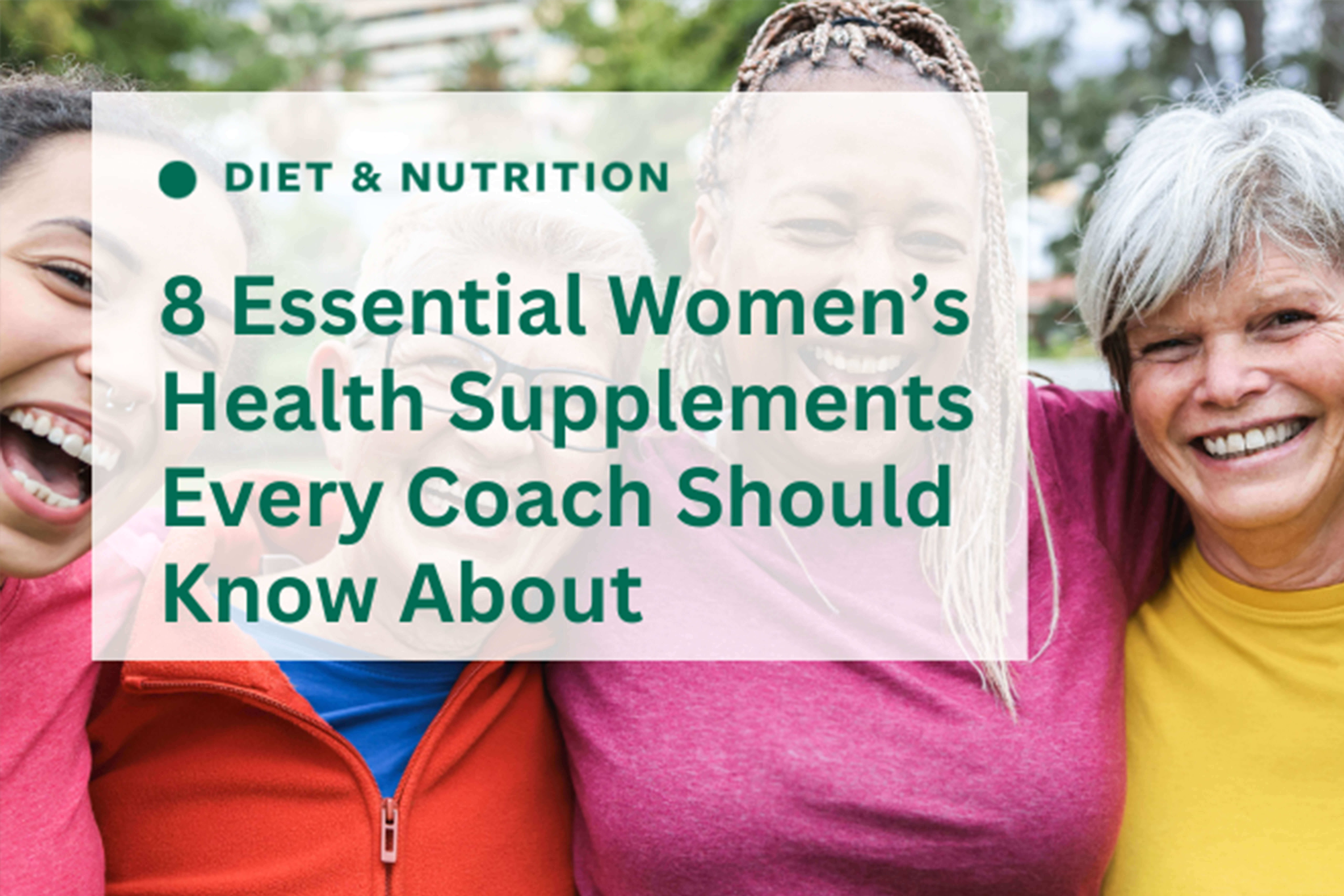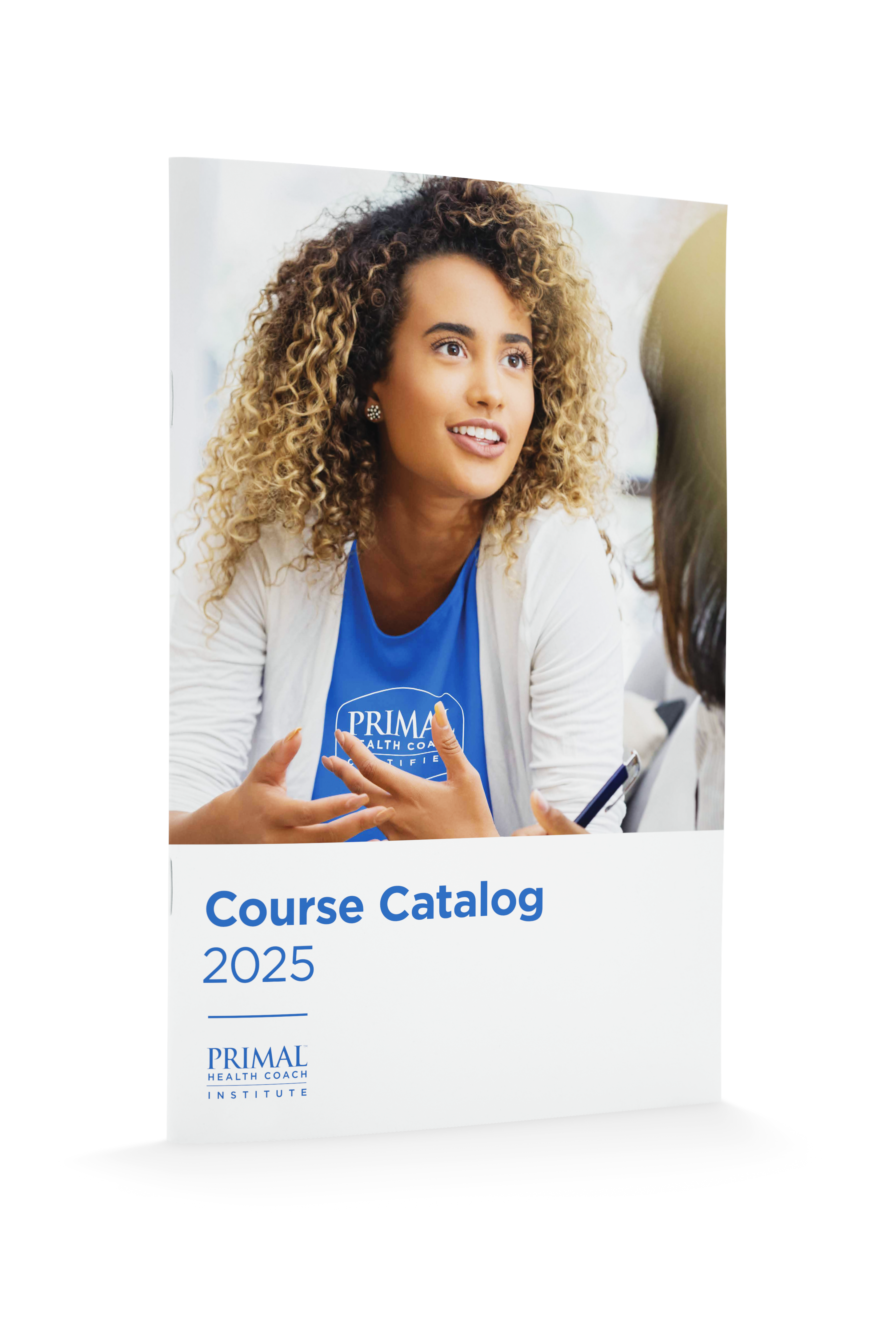Throughout our lives, women's bodies experience unique changes. From monthly periods to pregnancy, and eventually menopause. Understanding which women’s health supplements matter most for your female clients is essential for every coach.

Women's health supplements are there to fill in the gaps, so you can keep feeling your best, for longer.
If you work with women, then you’ll understand that supporting them through their wellness journey often means more than diet and exercise. Despite our best efforts, sometimes women need a little extra support. Supplements for women’s health can help fill nutritional gaps, regulate hormones, and improve overall health.
In this post, we’ll share our top 8 women’s health supplements. You can feel confident knowing that these hand-picked supplements are backed by:
- Peer-reviewed studies
- Reference intakes
- Insights from the Office of Dietary Supplements
- Office on Women’s Health
- National Institutes of Health
1. Daily Multivitamins for Women
In a perfect world, we would consume an adequate amount of vitamins and minerals through our diet alone. But even with the best intentions — buying locally grown produce and eating whole foods — modern farming practices and busy lifestyles can make this difficult. A simple way to ensure your clients receive the necessary nutrients is with a daily multivitamin for women.
A good women’s multivitamin is one of the most important ways to cover essential vitamins and nutrients. Women often juggle busy lifestyles, and daily multivitamins can bridge nutritional gaps. Always look for a comprehensive blend that includes fat-soluble vitamins (A, D, E, K) and water-soluble vitamins like Vitamin C (ascorbic acid).
The Dietary Reference Intakes (DRIs) and Recommended Dietary Allowance (RDA) provide guidance on adequate amounts for overall wellness. Daily multivitamins are one of the cornerstone women’s health supplements for supporting energy, immunity, and general wellbeing.
2. Vitamin D Supplements
Many women struggle with vitamin D deficiency, particularly younger women and postmenopausal women. Vitamin D is vital for bone health, muscle function, and immune support.
Also known as the "sunshine vitamin,” vitamin D is synthesized in the skin via UVB exposure. While sunlight is the most effective way to boost vitamin D, environmental factors, skin pigmentation, sunscreen, season, and aging may reduce absorption.
Vitamin D is also found in egg yolks and dairy products, though lactose intolerance may limit intake. Women unable to get sufficient vitamin D from sun or food should consider supplementation.
Vitamin D supplements are key women’s health supplements for bone, muscle, and immune support. The NIH Calcium Fact Sheet highlights its role in calcium absorption, bone strength, and preventing bone loss. A controlled trial in The American Journal of Clinical Nutrition linked supplementation to reduced risk of age-related diseases.
3. Omega-3 Supplements for Heart and Brain Health
Omega-3 fatty acids are essential for optimal brain and heart function. Deficiencies have been associated with cardiovascular disease, some cancers, mood disorders, and arthritis.
The main omega-3 fatty acids are DHA and EPA (found in fatty fish such as salmon, mackerel, and sardines), and ALA (found in flaxseeds, chia seeds, walnuts, and pumpkin seeds). Omega-3-rich foods are ideal, but omega-3 supplements are valuable for women who don’t eat fish.
According to Harvard Health, omega-3 supplementation can reduce cardiovascular risk and support brain health in deficient individuals. Research shows no extra benefits for those already consuming adequate omega-3s.
4. Iron for Energy and Healthy Development
Some women are at risk of iron deficiency anemia, particularly those experiencing:
- Heavy menstrual periods
- Pregnancy and childbirth
- NSAID use or gastrointestinal bleeding
- Certain chronic conditions or frequent blood donations
Low iron can lead to fatigue, compromised immunity, and other health issues. Food sources include red meat, dark chocolate, Brussels sprouts, and dairy. For women with higher needs, iron supplementation (oral or intravenous) may be required — but always under medical supervision.
Iron remains a foundational women’s health supplement for energy, immunity, and healthy development.
5. Prenatal and Pregnancy Support Supplements
For women planning pregnancy, prenatal supplements with folic acid are essential to prevent birth defects such as spina bifida.
The Centers for Disease Control and Prevention (CDC) recommends prenatal vitamins for reproductive health, immune support, bone strength, and healthy baby development. These are safe for women with morning sickness, and are a core set of women’s health supplements for pregnancy.
6. Calcium and Magnesium for Strong Bones
Bone health is a critical concern for women, especially as estrogen declines with perimenopause and menopause. Poor calcium absorption can lead to osteopenia or osteoporosis, while magnesium supports muscle function and cellular health.
Leafy greens, sprouts, and Brussels sprouts provide natural calcium and magnesium, but supplementation may be needed to meet daily requirements. Calcium and magnesium supplements are proven women’s health supplements for strong bones at every life stage.
7. Herbal Supplements for Hormonal Balance
Hormonal balance impacts mood, energy, and overall wellbeing. Herbal supplements like black cohosh and chasteberry are popular for easing menopause symptoms.
Always select brands with third-party testing, clear sourcing, and reputable practices. While herbal supplements are promising, scientific evidence is still limited. Further research is needed to confirm efficacy.
8. Probiotics and Digestive Support
Gut health influences immunity, vaginal health, and even brain function. Probiotic supplements can support digestion, skin health, and reduce inflammation from conditions like irritable bowel disease (IBD).
The Mayo Clinic and National Library of Medicine note that probiotics improve wellness when paired with healthy habits. Probiotics are increasingly recognized as essential women’s health supplements for digestive and overall health.
Choosing the Right Brand
The supplement industry is booming, but not all products meet professional standards. When recommending vitamins and supplements, coaches should emphasize:
- Rigorous third-party testing and Non-GMO certification
- Sourcing transparency and adherence to FDA standards
- Checking editorial policies, privacy notices, and brand reputation
Final Thoughts: Women’s Health Supplements and Coaching
Supplementation is not one-size-fits-all. Women have unique needs depending on age, medical conditions, life stage, and wellness routines.
When integrated thoughtfully with whole foods and healthy habits, the right women’s health supplements can profoundly impact energy, immunity, and overall wellness. Always advise clients to consult health professionals before starting or stopping supplements, and follow guidance from DRIs, the NIH, the Office of Dietary Supplements, and American Family Physician.
The right women’s health supplements can help your female clients thrive, supporting them through each stage of life with confidence, health, and vitality.
Are you an aspiring health coach? Enroll today!



